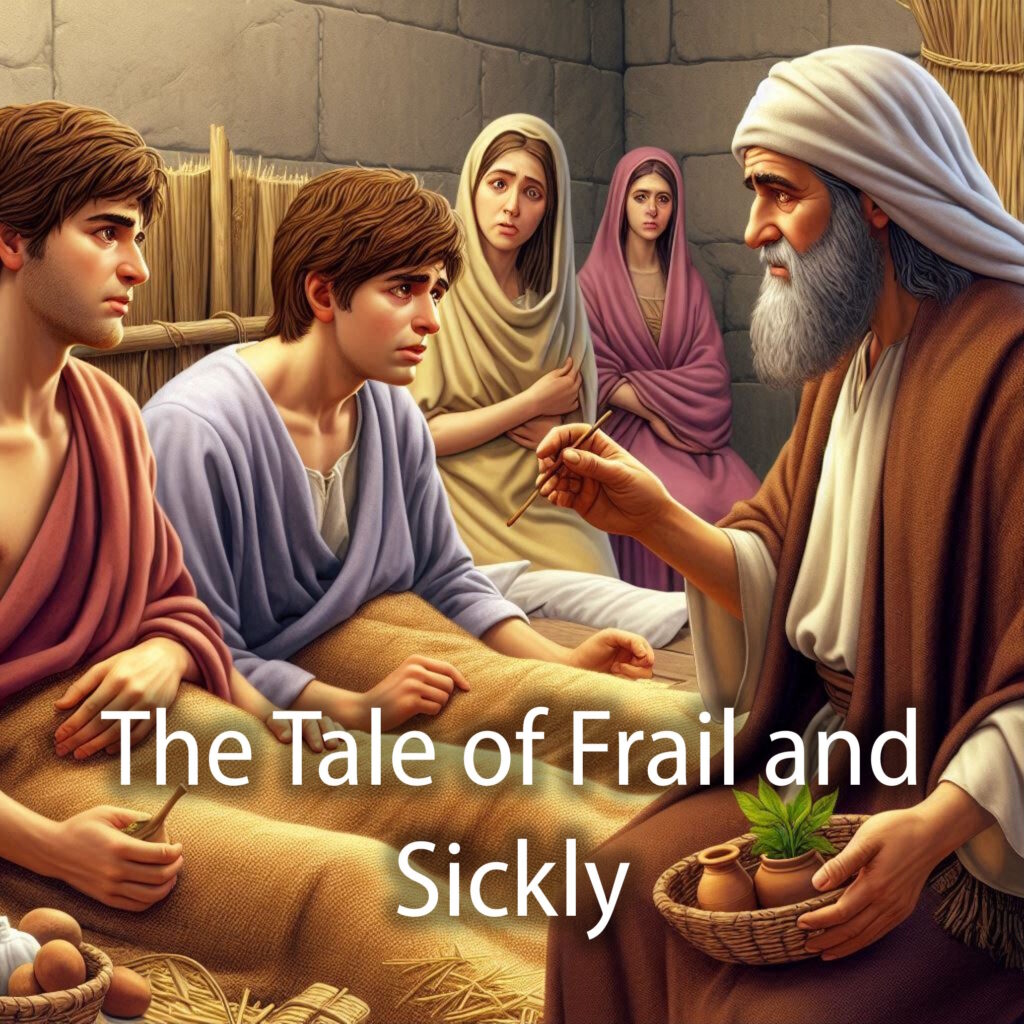Hespeler, November 3, 2024 © Scott McAndless – Twenty-Fourth Sunday after Pentecost
Ruth 1:1-18, Psalm 146, Hebrews 9:11-14, Mark 12:28-34
In the Book of Ruth the two sons of Naomi have rather odd names. They are named Mahlon and Chilion. These are, of course, Hebrew names, so you may not have thought much about them. But wait until I tell you what those names mean in Hebrew. Mahlon means “sickly,” and Chilion means “frail.”
Think about that for a moment. How could they have ended up with such names? What mother would name her child “sickly”? What father would choose to call his son “frail”? But these are apparently the names that they got. And, while we are imagining, think about Orpah and Ruth, meeting such men as prospective husbands. What would you think if your future spouse bore such a name? I can’t imagine that they would have been very thrilled.
Names Make Sense in the Story
So, the names do not make a lot of sense in practical terms. The names do make a great deal of sense, however, in terms of the story that is being told. They are, in fact, perfect names from the narrator’s point of view because they give a strong signal to the reader of what is going to happen to these two young men. No sooner are they introduced, and they are barely married, than they both die. Hmm, do you think that their wives should have taken their names as a bit of a warning?
So, what’s the real story behind the naming of these young men, Frail and Sickly? And, yes, I am going to just forget about their Hebrew names that no one ever remembers anyway and call them who they are: Frail and Sickly. That is, after all, basically their entire identity in this story.
There are No Accidents
Is it possible that the author of this story just made up the names of these characters – kind of like when Shakespeare created the character of Desdemona (whose name means ill fortune) in his play Othello? That does seem possible. It is generally thought that the Book of Ruth was written centuries after the original events, so maybe he had no record of their names and had to make something up.
But I usually prefer to think that, if something is there in the Bible, it’s not just there by accident. No, I prefer to think that, rather than just making a name up to cover up what he doesn’t know and is hoping we won’t notice, I think he chose these names very intentionally. Frail and Sickly are there to teach us something. But what could that lesson be?
The Period of the Judges
The Book of Ruth is a book about a major shift. The book is set, as it says in the opening words, “In the days when the judges ruled.” This was a time when the people of Israel were little more than a collection of tribes living in the land. Each tribe basically took care of their own affairs. There was nothing like a united national government.
But when the tribes were faced with something that they couldn’t handle on their own, like invaders or raiders, they would band together and a judge would be appointed to lead them, to call up the tribal militias or do whatever else was needed to counter the threat.
That was the system. It was likely not perfect, but it had allowed the tribes to maintain their independence and to survive for about as long as anyone could remember. But the Book of Ruth is not really about the tribal system. It is about the transition to something new.
The Transition to Monarchy
The book ends by telling us that its main character has a child who will become the grandfather of the great King David. This book is about the transition from a tribal to a national, monarchical government.
And major transitions like that do not come out of nowhere. People are generally conservative about such things. They know that big changes will cause much disruption and chaos, and so they tend to resist them. It takes a lot to make people want a transition.
And yet we are told in the Bible that the change to a monarchy only came because the people demanded it. The Prophet Samuel and even God warned them that the change would be costly to them, but they insisted, and so God gave them what they wanted. That’s how the story is told.
Living Through Transition
I suspect that is what the author of this book is trying to address with these two characters, Frail and Sickly. They are ancient Israelite tribesmen – Ephrathites from Bethlehem in the tribe of Judah. They represent the insular tribal past – a past that clearly had its strengths and its benefits. But the world was changing and, because the world was changing, the old institutions had become frail and sickly.
The reason why the Israelites demanded a king, we are told, was because they wanted to be “like other nations.” (1 Samuel 8:4) But you need to understand that this was not just a matter of feeling jealous of what other nations had. It had more to do with the fact that neither threats and problems nor economic opportunities could be managed by the old system anymore.
Fragile Institutions
If that is what these two characters represent, then I think it is very important for us to reflect on them. I would suggest that we are also living in times of great transition. And what often happens when you are living through transition is that you find that the institutions and leadership that were set up to manage and meet the challenges and opportunities of the way things used to be no longer quite work in the same way anymore.

Instead of being strong and robust to meet the challenges of the day, we discover that they are surprisingly frail and sickly. I realize that that is somewhat inflammatory language. But I’m not choosing that language, it comes from the author of the Book of Ruth.
We see that in our times as various institutions no longer quite seem to function as well as they once did. Political systems break down. Policing, education and financial institutions are no longer as effective as they once were. We seem to have been experiencing a lot of that kind of thing recently.
The Old Situation
But let me speak of this in terms of something we can relate to – the recent history of the church in this area. This congregation was founded and built in a very different world from the one where it finds itself today. It was built in a small industrial village. It was built at a time when the closest Presbyterian churches in places like Galt, Preston and Doon were a good 60 minutes away across country roads on horseback.
More recently, this congregation built up its strength at a time when the professional clergy drove the church. It thrived at a time when every congregation (or at least a couple of congregations together) could call and afford to pay a full-time minister who would lead the charge and set the policies. And all of our government and systems were optimized to benefit from that sort of church.
Transitions
Have you noticed that that is not really the same situation where we find ourselves today. Thanks to the construction of the world’s busiest highway right on our doorstep, distances between churches are not what they used to be. And many of those churches that are now so much closer are facing crises in terms of calling and affording ministers to lead them.
Those are just a couple of the major changes that we are dealing with as congregations. I’m sure you could name some others. But that is enough to make us realize that, if some of the systems and policies and leadership that were put in place and that led our congregations so effectively in a previous situation may not be working as well today. They may even feel a bit frail and sickly when it comes to meeting our present challenges and we have to prop them up in order to maintain the illusion that nothing needs to change.
So, I do think that the two sons of Naomi may speak to us as we live in times of transition today. But I want to be clear here that I am not saying that the church is or will necessarily become frail and sickly. It is something that may happen if we cannot let go of old patterns and old ways of organizing ourselves, but it is not our destiny; it is not inevitable.
Looking Outward
The Book of Ruth starts with evidence of the old system breaking down under the weight of a changing world. But it also shows us what we need to do about it. And the first step is clearly to move away from a narrow and insular view. When Naomi’s family can’t deal with the crisis of the moment, which comes in the form of a famine, they decide to seek for a way to cope elsewhere.
“They went into the country of Moab and remained there,” it says. And that doesn’t actually seem to make much sense at first glance if the problem they are dealing with is famine. Moab wasn’t really all that far from Judah. It seems reasonable to assume that, if there was a famine in Judah – something usually caused by a drought or some other ecological disaster like a locust swarm – the crops would have been no better in Moab.
The Advantage in Moab
So, there must have been something else, something other than the natural environment, that offered an advantage to being in Moab. What could that have been?
I think the answer to that is clear. There was something about Moab, about the people there. Certainly, there was something in the two that we meet: Orpah and Ruth. They were women of extraordinary wisdom, commitment and industry.
And, as the story continues, we discover that Ruth – who is the one who decides to return to Judah with Naomi – is more than a replacement for the two sons, Frail and Sickly, who die in Moab. She almost singlehandedly saves not only the family of Naomi but the tribe of Judah. Ultimately her decisions will save the entire nation of Israel.
How We can Look Outwards
And I believe that there is a message there for us as we navigate living through times of transition. What do we do when we find that our systems and ways of doing things don’t quite seem to be working very well in a changing world? Often the impulse is to focus back inwards on our own needs.
We turn in on ourselves and focus on our own little place of Ephrathah, on our tribe of Judah. We work harder and invest more on keeping the old systems on life support. The result is often frail and sickly institutions that aren’t up to meeting the challenges of the day. We may end up spiraling ever downwards.
The Book of Ruth teaches us to look outwards, to look to Moab. And that feels frightening. That feels dangerous. In fact, it is exactly the kind of focus that is condemned often enough in the Bible.
Foreign Women
There are several stories in the Bible about how young Hebrew men should definitely not marry foreign women including specifically women from Moab. They were feared as a dangerous, foreign influence who might bring with them ties to other gods.
And maybe there were times when that kind of approach worked for the people of Israel, but when times of transition came, this Book of Ruth makes it very clear that there was a need to change that approach. It shows us that true strength, especially in times of transition, can only come when we cast our eyes outwards and seek strength outside of our tribe.
Our Future
And I believe that that is where our moment of transition will lead us as well. I don’t know exactly what that future will look like, but I do believe that we will find it by thinking outside of the box of our own congregation. I believe we will find it by working creatively with others and sharing strengths together. This possible new connection with Knox Preston could be part of that and let us all pray for wisdom in discerning that, but even that has to be only a part of a wider vision.
I personally think that we need to find ways of thinking about our Christian ministry on a regional level – bringing congregations together in new partnerships where we share resources. We can’t afford just to think in terms of what is good for our congregation in Hespeler anymore.
And if any of our present systems are feeling frail or sickly today, above all I would not take that as a defeat or a failure on our part. It is a symptom of the transitional times in which we live. Naomi and her husband and her sons, Frail and Sickly, took a risk and found new strength for their family outside of what was familiar and comfortable. Will we have the courage to do likewise?




